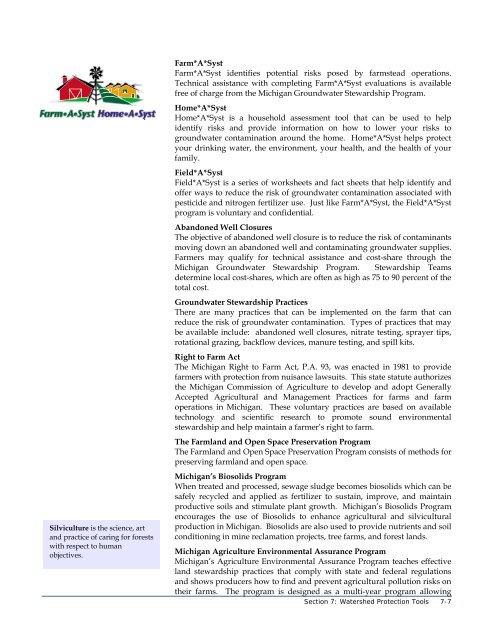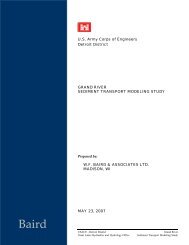Looking Glass River Watershed Management Plan - Greater ...
Looking Glass River Watershed Management Plan - Greater ...
Looking Glass River Watershed Management Plan - Greater ...
Create successful ePaper yourself
Turn your PDF publications into a flip-book with our unique Google optimized e-Paper software.
Silviculture is the science, art<br />
and practice of caring for forests<br />
with respect to human<br />
objectives.<br />
Farm*A*Syst<br />
Farm*A*Syst identifies potential risks posed by farmstead operations.<br />
Technical assistance with completing Farm*A*Syst evaluations is available<br />
free of charge from the Michigan Groundwater Stewardship Program.<br />
Home*A*Syst<br />
Home*A*Syst is a household assessment tool that can be used to help<br />
identify risks and provide information on how to lower your risks to<br />
groundwater contamination around the home. Home*A*Syst helps protect<br />
your drinking water, the environment, your health, and the health of your<br />
family.<br />
Field*A*Syst<br />
Field*A*Syst is a series of worksheets and fact sheets that help identify and<br />
offer ways to reduce the risk of groundwater contamination associated with<br />
pesticide and nitrogen fertilizer use. Just like Farm*A*Syst, the Field*A*Syst<br />
program is voluntary and confidential.<br />
Abandoned Well Closures<br />
The objective of abandoned well closure is to reduce the risk of contaminants<br />
moving down an abandoned well and contaminating groundwater supplies.<br />
Farmers may qualify for technical assistance and cost-share through the<br />
Michigan Groundwater Stewardship Program. Stewardship Teams<br />
determine local cost-shares, which are often as high as 75 to 90 percent of the<br />
total cost.<br />
Groundwater Stewardship Practices<br />
There are many practices that can be implemented on the farm that can<br />
reduce the risk of groundwater contamination. Types of practices that may<br />
be available include: abandoned well closures, nitrate testing, sprayer tips,<br />
rotational grazing, backflow devices, manure testing, and spill kits.<br />
Right to Farm Act<br />
The Michigan Right to Farm Act, P.A. 93, was enacted in 1981 to provide<br />
farmers with protection from nuisance lawsuits. This state statute authorizes<br />
the Michigan Commission of Agriculture to develop and adopt Generally<br />
Accepted Agricultural and <strong>Management</strong> Practices for farms and farm<br />
operations in Michigan. These voluntary practices are based on available<br />
technology and scientific research to promote sound environmental<br />
stewardship and help maintain a farmer’s right to farm.<br />
The Farmland and Open Space Preservation Program<br />
The Farmland and Open Space Preservation Program consists of methods for<br />
preserving farmland and open space.<br />
Michigan’s Biosolids Program<br />
When treated and processed, sewage sludge becomes biosolids which can be<br />
safely recycled and applied as fertilizer to sustain, improve, and maintain<br />
productive soils and stimulate plant growth. Michigan’s Biosolids Program<br />
encourages the use of Biosolids to enhance agricultural and silvicultural<br />
production in Michigan. Biosolids are also used to provide nutrients and soil<br />
conditioning in mine reclamation projects, tree farms, and forest lands.<br />
Michigan Agriculture Environmental Assurance Program<br />
Michigan’s Agriculture Environmental Assurance Program teaches effective<br />
land stewardship practices that comply with state and federal regulations<br />
and shows producers how to find and prevent agricultural pollution risks on<br />
their farms. The program is designed as a multi-year program allowing<br />
Section 7: <strong>Watershed</strong> Protection Tools 7-7





